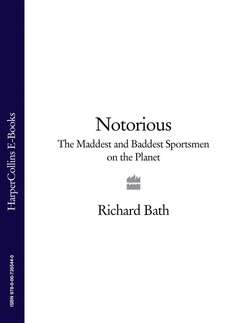Читать книгу Notorious: The Maddest and Baddest Sportsmen on the Planet - Richard Bath - Страница 19
TY COBB ‘Ty Cobb is a prick’
ОглавлениеTy Cobb, otherwise known as the Georgia Peach, is probably the nastiest bastard on this whole list, and certainly one of the most talented. One of the most sublime baseball batters of all time, the Detroit Tiger was also such a racist, misogynist, and violent drunk that his hand-picked biographer, Al Stump, later called Cobb ‘the most violent, successful, thoroughly maladjusted personality ever to pass across American sports’. Ernest Hemingway was a bit more succinct: he described Cobb as ‘a total shit’. Babe Ruth was most succinct of all: ‘Ty Cobb is a prick’.
A baseball Hall-of-Famer, Cobb was so utterly unpleasant that despite over twenty years at the top before hanging up his bat in 1928, not one former teammate turned up at his funeral in 1961. Not that anybody was surprised: he fought with team-mates and opposition alike, spiked fellow players, hit them, screamed at them and once even tried to fight fellow Hall-of-Famer Lou Gehrig, the New York Yankees’ peerless (and peerlessly behaved) batsman. So unpleasant was Cobb that when the team played away and travelled by train he insisted upon having his own compartment and slept with a gun under a pillow because he was obsessed with the idea that one of his team-mates would murder him given half a chance. He was probably right to worry.
But if Cobb hated his team-mates, it was as nothing compared to the bile he reserved for the fans. A notorious and open racist, at various stages he stabbed a black groundskeeper, grabbed his wife by the throat, and pushed a black chambermaid down the stairs. In one particularly appalling incident in 1912 at New York City’s Hilltop Park, Cobb jumped into the stands and relentlessly battered a fan he said had verbally abused him. Nobody else had heard the fan, who happened to be black and handicapped—he had no fingers—say anything untoward.
Nobody was safe from Cobb’s psychopathic temper. In 1921, by which time he had become the Tigers’ playermanager, he confronted umpire Billy Evans under the stands after a game. After lambasting the poor official, and then telling him that ‘I only fight one way, to kill’, Cobb went berserk and repeatedly slammed the umpire’s head against a slab of concrete until Evans lost consciousness. As he had already beaten-up several newsmen, the incident was kept under wraps.
A millionaire many times over, Cobb lived in a huge mansion but refused to have it connected to the national grid because he thought the electric companies charged too much for their services.
Given his fondness for wanton violence, his love for filthy lucre, and the fact that he always carried a handgun, it must have been a brave man who’d try to mug him, yet in 1912 someone was stupid enough to attempt to steal Cobb’s wallet. The man was, naturally enough, pistol whipped by his intended victim, who then stabbed him to death. Cobb got off on the basis of self-defence, but was soon in trouble again. Later that same year, he was the chief suspect in a murder which took place in broad daylight outside of Boston’s Fenway Park. The unfortunate man had been beaten to death with a baseball bat, but despite several witnesses, not one was willing to identify Cobb, who was never charged.
Few sportsmen have been more despicable human beings than Cobb, as Ron Shelton, a former minor league player who wrote and directed the film Cobb, which examined the darker sides of the Georgia Peach’s life, was the first to admit. ‘All the bottled rage he seems to have on the field, the fights, the incidents with fans, the social dysfunction—that’s all Cobb,’ said Shelton.
The man himself was utterly unrepentant though. ‘They were all against me, tried every trick to cut me down,’ said Cobb shortly before he died. ‘But I beat the bastards and left them in the ditch.’
